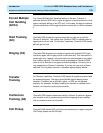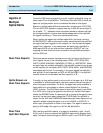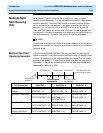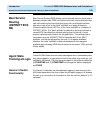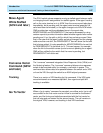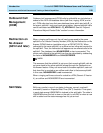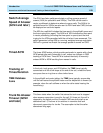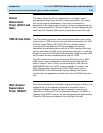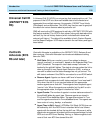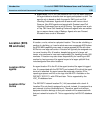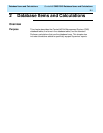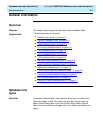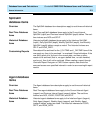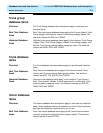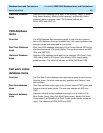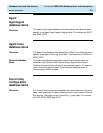
Introduction
CentreVu®
CMS R3V8 Database Items and Calculations
Interactions with Switch Features and Tracking of Switch Capabilities 1-31
Universal Call ID
(
DEFINITY
ECS
R6)
1
A Universal Call ID (UCID) is a unique tag that is assigned to a call. The
purpose of the UCID is to allow call-related data to be collected and
aggregated from multiple sources (for example,
DEFINITY
and
Intuity
Conversant
) and multiple sites. The UCID may then be used to group all
the data from various sources about a particular call.
CMS will receive the UCID assigned to calls by a
DEFINITY
ECS R6 with
this feature enabled. The UCID is then stored, along with data about the
call itself, by the call history feature (which includes both internal and
external call history). The data will be available to both Custom Reports
and the Report Designer. UCID data is stored in the call history and agent
trace tables.
CentreVu
Advocate (ECS
R6 and later)
1
CentreVu
Advocate is available on the
DEFINITY
ECS, Release 6 and
later versions.
CentreVu
Advocate has introduced database tracking
items for CMS:
●
Skill State: Skills can now be in one of four states (unknown,
normal, overload 1 or overload 2), based on the Expected Wait Time
(EWT) threshold. Time spent in each state except “unknown” is
tracked in the split/skill tables. The state is unknown when the link is
down or the split is non-Expert Agent Selection (EAS), or when a
new skill is added and the state message has not yet arrived. The
skill state is unknown if the CMS is connected to a non-R3V6 switch.
●
Reserve Agent: Agents can have a skill level of reserve1 or
reserve2 that corresponds to skill states overload 1 and overload 2.
Only when the skill is in an overload state will the appropriate
reserve agents serve that skill. These agents have a special agent
“service” role. When the agents are available, but the skill is not in
the appropriate state, the agent is tracked as “other.”
●
Agent Counts: The number of agents in various states are stored in
the split/skill tables by agent type. Reserve agents are stored in
R1
xxx
and R2
xxx
database items. Top agents are stored in T
xxx
and flex agents are stored in F
xxx
database items. Flex agents can
have a role of roving, backup, or allocated.
●
Agent Time in Skill: Agents’ ACD/After Call Work (ACW) time can
be tracked by skill. Non-ACD time in standard skills is as follows:
agents with the tracked skill as the top skill use 100 percent, while
agents who are percent allocated use the same percentage for both
ACD and non-ACD time. Backup, Roving, or Reserve agents track
none of their non-ACD time toward this skill.



